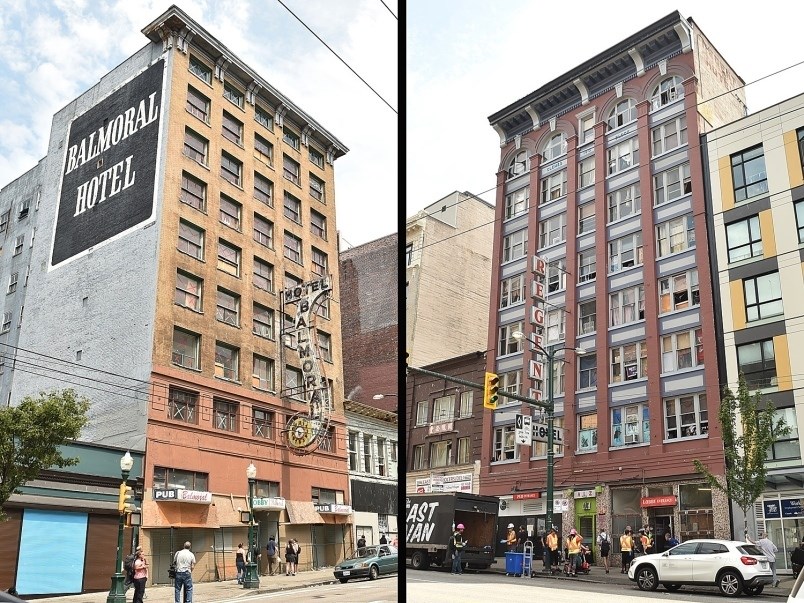The city bought the Balmoral and Regent hotels last November from the Sahota family for an undisclosed sum. The stated intention at the time was to turn the buildings, which have a combined total of 300 rooms, into safe and secure low-income housing.
Since the purchase of the hotels, the city has paid $91,000 per month to protect the buildings and maintain a “fire watch,” according to information supplied to Glacier Media this week from the city.
The monthly tab has also included costs for maintenance and utilities, with funds coming from empty homes tax revenue. A preliminary report on next year’s budget requests another $500,000 be spent in 2022 for security at the hotel sites, which face each other on East Hastings near Main Street.
“The city has an obligation to ensure these buildings are maintained to address existing risks and so that they can provide future housing in the Downtown Eastside,” the city said in an email. “Advancing work on these two sites with BC Housing is a high priority for the city.”
Balmoral to be demolished
The city has yet to release any development plans or timeline for the properties. Neither has the city’s partner, BC Housing, although its CEO Shayne Ramsay told Glacier Media earlier this year that the Balmoral will likely be demolished and the Regent renovated.
“BC Housing is working closely with the City of Vancouver as they develop a housing plan for both sites as it’s clear the buildings are in desperate need of renovations to bring them up to code and create safe and comfortable homes,” a representative from BC Housing said in an emailed statement.
“While we are working with them, the city is leading in this work and is best placed to talk about the status of it, as well as plans for public consultation.”
Sandra Singh, the city’s general manager of arts, culture and community services, told city council last week that “active discussions” continue with BC Housing and that an update on plans for the hotels will be provided to politicians early in the new year.
Councillors Pete Fry and Jean Swanson had questions at the Nov. 2 meeting about the ongoing costs associated to the two hotels and lack of details about future plans for the buildings one year after the city’s purchase.
In interviews this week, both Fry and Swanson said they were surprised at how expensive the monthly bill was to protect and maintain both hotels. Fry suggested council should have had a clearer understanding of the $91,000 monthly tab when the agreement was reached with the Sahota family.
“I get that it's a complicated situation, and that leaving them unsecured is not an option either,” he said. “But I think we need to have a more assertive approach to this. And it's probably something that should have come up more clearly in the expropriation conversation that we would be having to spend these kinds of dollars.”
Fire systems to be installed in December
Swanson suggested the city could find cheaper options, particularly with security.
The city said this week that sprinklers, a fire panel with electronic monitoring, pull alarm stations, smoke detectors and emergency lighting are expected to be installed in both hotels in December.
That will reduce monthly costs from $91,000 to $42,000 — and when multiplied over 12 months equals roughly $500,000, which explains the request from city staff in the 2020 preliminary budget report.
Housing activist Wendy Pedersen, who urged the city for years to buy the Balmoral and Regent from the Sahota family, said she was surprised at the cost of protecting and maintaining the hotels.
There is an urgency, she added, to begin construction or demolition on the properties to create the promised low-income housing, which is needed in a city that had an estimated street homeless population last year of 750.
“It has to get going — we are desperate,” said Pedersen, who estimated 1,000 people lived in the Balmoral and Regent before they were closed in 2017 and 2018. “So I think that’s caused havoc in the community, losing all those homes. Some of the hardest-to-house people in the city were living there. That’s a travesty.”
The monthly costs borne by the city do not include the unknown but significant costs the city has spent over several decades on enforcing orders at the hotels. The city closed both buildings because they were deemed unsafe to occupy.
At the time, the city cited engineering reports detailing fire hazards, rotting wood, sagging floors, water damage and mould inside the Balmoral. Similar problems were raised by the city in its decision to close the Regent.
In November 2019, the city's estimate to repair both hotels was $90 million.
Regent, Balmoral make 'top-10' list of problem hotels
The Regent and Balmoral have made the city’s top-10 list of problem hotels for almost 20 years and have been cited by police in numerous reports for drug activity, violence and other crimes.
Glacier Media reported in April 2018 that police responded to 845 calls in and outside the Regent between Jan. 1, 2017 and Feb. 22, 2018; the Balmoral generated 248 calls for the same period, although it was closed in June 2017.
Vancouver police statistics provided to Glacier Media this week for calls to both buildings since December 2020 totaled 14. Break and enters in progress, mischief, suspicious circumstances and assist fire and ambulance were among the calls.
Though the city has yet to release how much it paid for the hotels, the Sahota family’s lawyer told council in November 2019 that they had received multiple private offers ranging from $7 million to $12.5 million for each building.
@Howellings




